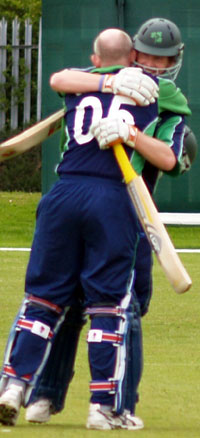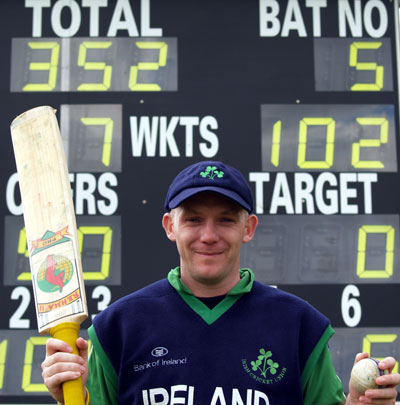
At a windswept Bangor in June 2005, Peter Gillespie took the MCC attack apart on his way to the fastest hundred in Irish history.
The game should have been played at Lord's but the MCC agreed totravel out of turn, saving the ICU a lot of money - plus ca change). The other advantage was that they would play two 50-over games which would aid the Irish in preparation for the ICC Trophy which they would be hosting the following month.
It was Bangor's first hosting of an Irish game and as always seems to be with these events, having waited 150 years, Upritchard Park would be the scene just 17 days later as Ireland beat Denmark to ensure World Cup qualification as Group Winners.
The MCC had Irish international Derek Heasley and soon to be capped David Langford-Smith in their squad, while Darren Bicknell captained what Derek Scott described in his report as "one of the weakest teams ever, particularly in the bowling department".
Ireland had two new caps in their ranks, with Gary Wilson a late call-up to replace the injured Jeremy Bray, while Mark Hutchinson won his only cap on his home ground.
However, it was Strabane man Peter Gillespie who grabbed the headlines as he bludgeoned an attack already on the ropes as Conor Armstrong hit 90, with Dom Joyce and Kyle McCallan both making half centuries.
Scott described the proceedings as Gillespie overtook the record previously held by John Prior, who had taken 51 balls and 51 minutes to hit his hundred against Warwickshire, taking a distinct like to England Test bowler Gladstone Small, who he distributed to various parts of Dublin's streets.
Gillespie's innings began at 1.17 p.m. at the fall of the third wicket with the score on 218 and two balls bowled in the 39th over. 70 balls later the innings ended at 351 for 4 at 2.07 p.m. Gillespie faced 47 of those 70 balls. He failed to score off 10 balls. He had 13 singles, nine twos, one three, eight fours and six sixes in his 102*. 133 runs were put on off these final 70 balls with Armstrong (13 runs) and Hutchinson (7*) as Gillespie's partners.
It was Gillespie's first century for Ireland in his 85th innings and came after two near misses. After 47 overs he was 64 and a century did not look possible. However he managed 15 in the 48th over with two sixes. The came 12 in the 49th over. He was now 91.
He faced the last over and scored a two and a single. Now at 94 he lost the strike. Hutchinson's single off the third ball gave the strike back to Gillespie. The fourth ball yielded a two but then, horror, a dot ball. He needed a four off the last ball but achieved his goal in style with a six over backward square leg. It was a remarkable innings with all too few people to see it.
I was at the game for BBC Radio Foyle and Radio Ulster and on the lunchtime bulletin at 1.30pm there was little sign of the carnage that was to unfold.
However by the 2 o'clock bulletin he was on the brink of history and the Foyle sports section got a live description from my dulcet tones as the last ball sailed over the ropes to seal the record.

It was a great pity that none of his family were there that working day, given that they were such staunch supporters of Peter over the years. There was the consolation the following month of a superb innings that ensured Ireland beat Canada in the ICC Trophy semi-final, and of course they were present when he played at the World Cup in 2007, before retiring shortly thereafter, having won 124 caps.
Kevin O'Brien came close in 2011 when he took just 50 balls in the World Cup win over England, but Gillespie's record still stands 15 years on from that cold and blustery day in Bangor.
